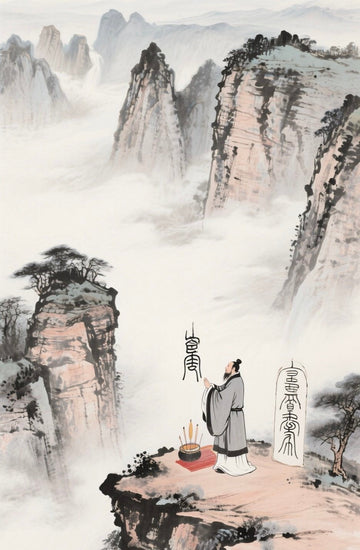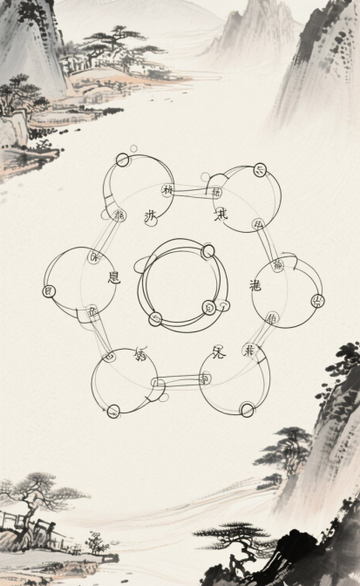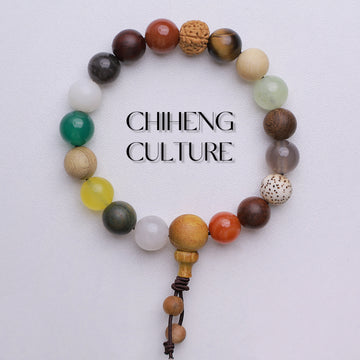When it comes to Chinese Taoist culture, some people think it is just philosophical speculation in ancient books, far from daily life. In fact, the profound and extensive nature of Taoist culture lies precisely in its ability to integrate into the trivialities of daily life—from the mindset to cope with stress, to the way of maintaining health, and even to the wisdom of handling interpersonal relationships, we can find practical "life solutions" in Taoist thought. It helps us live a more calm and insightful life in this fast-paced era.
Resolve "Excessive Anxiety" with the Mentality of "Wu-wei" (Non-action)
Many people are often trapped by the obsession of "having to be the best" or "must achieve the goal". Clearly, they have worked very hard, but they still suffer from anxiety and insomnia due to worrying about the results. The "Wu-wei" advocated by Taoism does not mean doing nothing (lying flat); instead, it opposes "overexertion". As Laozi said, "He who stands on tiptoe cannot stand firm; he who strides forward cannot walk far." Deliberate pursuit often leads to the opposite effect.
For example, some people stay up late to work overtime and overdraw their health in order to get a promotion. As a result, not only does their work efficiency decrease, but they also miss opportunities due to poor physical and mental state. However, those who understand the wisdom of "Wu-wei" will do their due work at a steady pace, without obsessing over "must succeed". Instead, they can keep a clear mind and seize opportunities at critical moments. In our daily life, we can also do the same: do not pursue "perfectionism" when making plans, do not force ourselves to "overwork" when completing tasks, and accept the rhythm of "taking it step by step". In this way, anxiety will naturally decrease. This kind of mentality of "following the rules and not acting recklessly" helps us maintain inner peace amid busyness and avoid being manipulated by desires.
Nurture Physical and Mental Health by "Following Nature"
Nowadays, many people are troubled by "sub-health": prolonged sitting causes back and waist pain, staying up late to scroll through mobile phones disrupts daily routines, and extreme dieting harms the stomach and intestines... The Taoist concept of "following nature" is precisely the most simple health wisdom. The saying "Nourish yang in spring and summer, nourish yin in autumn and winter" in Huangdi Neijing (Inner Canon of the Yellow Emperor) originates from Taoists' observation of natural laws. In spring, it is suitable to get up early for outings and stretch the body; in summer, moderate exercise and sweating to dispel dampness are recommended; in autumn, it is good to calm the mind and go to bed early to nourish yin; in winter, keeping warm and preserving energy while reducing consumption is advisable. By adjusting living habits according to the seasons, our body can naturally maintain balance.
Furthermore, the Taoist advocacy of "reducing selfish desires" is of great help to emotional health. Modern people are always troubled by the vanity of "wanting what others have": when seeing colleagues buy new cars, some people follow suit even though they are financially strained; when seeing others' travel photos online, some people feel upset just because they have no vacation. However, "reducing selfish desires" does not mean giving up pursuit. Instead, it helps us distinguish between "needs" and "wants"—clothes are enough as long as they fit, so there is no need to pursue famous brands; a house is sufficient as long as it is livable, so there is no need to blindly change to a larger one. Reducing unnecessary desires not only eases financial pressure but also calms our mindset, avoiding negative emotions such as jealousy and anxiety caused by excessive comparison, thus nurturing a good state from the inside out.
Resolve Interpersonal Conflicts with "Dialectical Thinking"
Conflicts are inevitable in life: quarreling with family members due to different views, falling out with colleagues over work differences, or having a rift with friends over trivial matters. At this time, the "dialectical thinking" of Taoism can be put into use. As stated in Tao Te Ching, "Misfortune is where fortune leans; fortune is where misfortune hides." It tells us that there is no absolute good or bad in things. From another perspective, conflicts may turn into opportunities to enhance relationships.
For instance, a quarrel with family members may seem to hurt the relationship, but it also helps both sides understand each other's needs: behind parents' urging to get married is their worry about your loneliness, while your resistance to it comes from your desire to stick to your own pace. Understanding this, you can put aside the argument and communicate well. When having differences with colleagues, instead of insisting on "I am right and he is wrong", you can think about "is there any rationality in his opinion?" Perhaps it can lead to a more perfect solution. Taoism also advocates "the highest virtue is like water", which means being like water that "benefits all things without contending". By not forcing others to accept your views, not clinging to arguing about right and wrong, and treating others with gentleness and tolerance, you can reduce interpersonal frictions and gain more harmonious relationships.
Cope with Life's Challenges by "Staying Gentle and Humble"
When facing difficulties, many people are used to "toughing it out", but the more they struggle, the more exhausted they become. However, Taoism tells us that "softness overcomes hardness": water seems the softest, yet it can penetrate stones; grass seems fragile, yet it can grow out of cracks in rocks. This wisdom of "staying gentle and humble" helps us cope with life's challenges more flexibly.
For example, when encountering a difficult problem at work, rushing to tackle it blindly may get you stuck in a dead end. At this time, you might as well "bypass the obstacle" like water—pause for a while, seek advice from experienced people, or try a different approach. This way, you may find a breakthrough. When facing setbacks in life, there is no need to force yourself to "cheer up immediately". Allow yourself a short period of adjustment, just like grass that slowly regains vitality after wind and rain. In this way, you will have more strength to start over. This attitude of "not confronting head-on and knowing how to adapt" is not weakness, but a wiser way of "overcoming hardness with softness", which helps us avoid detours and reduce internal friction in difficult times.
The profound and extensive Taoist culture is never just a theory confined to books, but a "practical wisdom" that can be integrated into life. It teaches us to stay away from anxiety, understand health preservation, know how to deal with people, and withstand pressure, helping us find our own "path of calmness" in this complex world. Perhaps we do not need to study ancient books in depth; we just need to have a little more mindset of "following the rules" and a little more clarity of "reducing selfish desires" in life. Then we can feel the changes brought by Taoist culture—making life easier and the heart more at ease.




